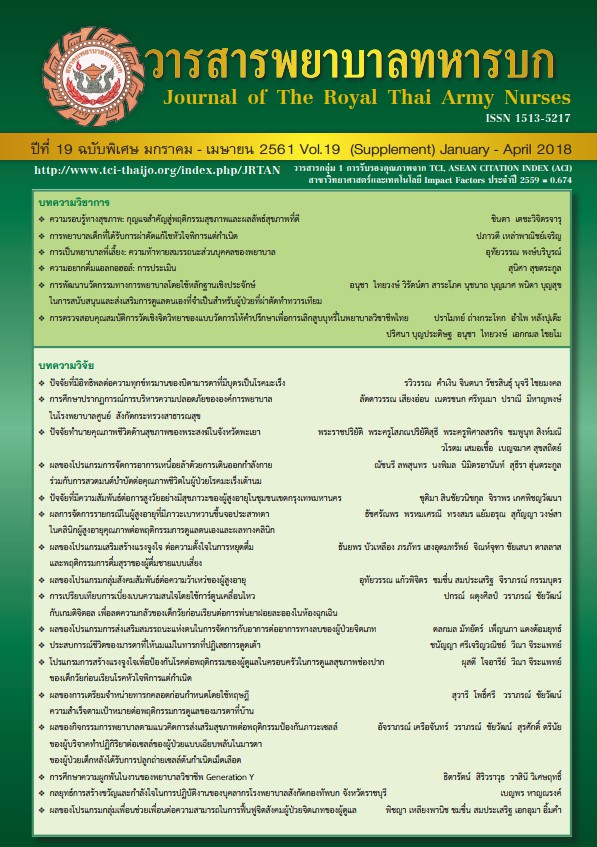A Study of Work Engagement of Generation Y Professional Nurse
Keywords:
Work Engagement, Generation Y, Staff nursesAbstract
The descriptive research design aimed at studying the work engagement of generation y professional nurses. The study was employed the Delphi technique. The subjects were composed of 21 experts divided into the following four groups: 1) four nursing administrators; 2) ten generation y professional nurses; 3) three human resource instructors and 4) four nursing instructors or nursing academics. The methodologies can be divided into three steps. Step 1 involved interviews with the experts about the characteristics of work engagement in generation y professional nurses. In Step 2, data were analyzed by using content analysis for developing the rating scale questionnaire. All of the items in the questionnaire were ranked for level of work engagement. In Step 3, data were analyzed by using median and quartile range for the development of a new version of the questionnaire. According to the research findings, the experts’ opinion had a consensus on work engagement in generation y professional nurses composed of 4 components and 33 items as follows 1) intention (11 items) 2) dedication (6 items) 3) pride (7 items) 4) creativity (9 items). All of the items are important (Med = 4.50 -4.85, IR = 0.37 -0.98).
Downloads
References
2. Bakker AB, Leiter MP. Work engagement: A handbook of essential theory and research: Psychology press; 2010.
3. Demerouti E, Cropanzano R. From thought to action: Employee work engagement and job performance. Work engagement: A handbook of essential theory and research. 2010;65: 147-63.
4. Harter JK, Schmidt FL, Hayes TL. Businessunit-level relationship between employee satisfaction, employee engagement, and business outcomes: a meta-analysis. American Psychological Association; 2002.
5. González-Romá V, Schaufeli WB, Bakker AB, Lloret S. Burnout and work engagement: Independent factors or opposite poles? Journal of vocational behavior. 2006;68(1): 165-74.
6. Antoinette Bargagliotti L. Work engagement in nursing: a concept analysis. Journal of advanced nursing. 2012;68(6):1414-28.
7. Weingarten RM. Four generations, one workplace: A Gen XY staff nurse’s view of team building in the emergency department. Journal of Emergency Nursing. 2009;35(1):27-30.
8. Yongprawat T., Noimunwai P., Prapaipanit W. The Relationships Between Generations, Magnetic Work Environment, and working Happiness as perceived by Professional Nurses. Journal of The Royal Thai Army Nurse. 2016;17(1):148-155 (in Thai).
9. Xanthopoulou D, Bakker AB, Demerouti E, Schaufeli WB. The role of personal resources in the job demands-resources model. International journal of stress management. 2007;14(2):121.
10. Macmillan TT. “The Delphi Technique.”. 1971.
11. Kim HJ, Shin KH, Swanger N. Burnout and engagement: A comparative analysis using the Big Five personality dimensions. International Journal of Hospitality Management. 2009;28(1):96-104.
12. Sullivan Havens D, Warshawsky NE, Vasey J. RN work engagement in generational cohorts: The view from rural US hospitals. Journal of nursing management. 2013;21(7):927-940.
13. Llorens S, Schaufeli W, Bakker A, Salanova M. Does a positive gain spiral of resources, efficacy beliefs and engagement exist? Computers in human behavior. 2007;23(1):825-841.
14. Macey WH, Schneider B. The meaning of employee engagement. Industrial and organizational Psychology. 2008;1(1):3-30.
15. Sonnentag S. Recovery, work engagement, and proactive behavior: a new look at the interface between nonwork and work. Journal of applied psychology. 2003;88(3):518.
Downloads
Published
How to Cite
Issue
Section
License
บทความหรือข้อคิดเห็นใดใดที่ปรากฏในวารสารพยาบาลทหารบกเป็นวรรณกรรมของผู้เขียน ซึ่งบรรณาธิการหรือสมาคมพยาบาลทหารบก ไม่จำเป็นต้องเห็นด้วย
บทความที่ได้รับการตีพิมพ์เป็นลิขสิทธิ์ของวารสารพยาบาลทหารบก
The ideas and opinions expressed in the Journal of The Royal Thai Army Nurses are those of the authors and not necessarily those
of the editor or Royal Thai Army Nurses Association.






